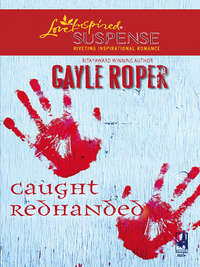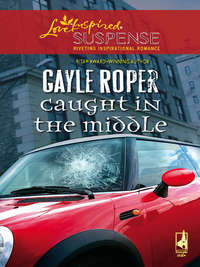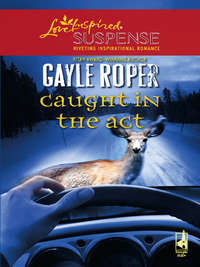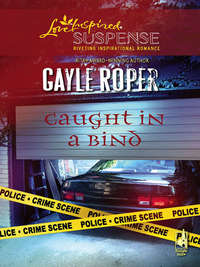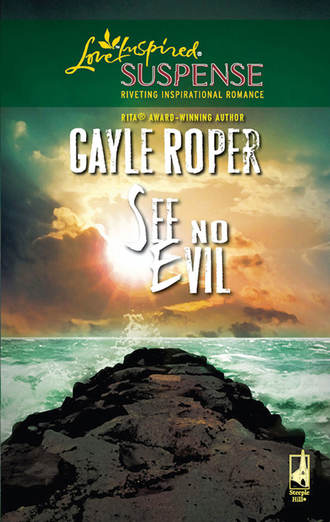
Полная версия
See No Evil

“Gray!” I wasn’t even embarrassed about the panic in my voice.
“Yeah?” He said as he emerged from the basement.
“Bring your light over here. Shine it on my arm.”
He did so. “You scratched yourself.”
I shook my head. “That’s the drip.”
“But it’s—”
I nodded.
He swung his penlight, and the beam picked out a red puddle on the floor, drops plummeting from above to splash in the viscous pool. A footprint repeated across the floor, getting fainter and fainter with each step until it was almost nonexistent when it stopped at my left shoe.
He trained the beam overhead, and a woman’s pale hand appeared, flung out over the opening. Gray and I looked at each other in dismay, knowing that where there was a hand, there was a body attached.
GAYLE ROPER
has always loved stories, and as a result she’s authored forty books. Gayle has won the Romance Writers of America’s RITA® Award for Best Inspirational Romance, repeatedly been a finalist for both the RITA® Award and the Christy Award, won three Holt Medallions, the Reviewers’ Choice Award, the Inspirational Readers Choice Contest and a Lifetime Achievement Award as well as the Award of Excellence. Several writers’ conferences have cited her for her contributions to the training of writers. Her articles have appeared in numerous periodicals, including Discipleship Journal and Moody Magazine, and she has contributed chapters and short stories to several anthologies. She enjoys speaking at writers’ conferences and women’s events, reading and eating out. She adores her kids and grandkids, and loves her own personal patron of the arts, her husband, Chuck.
Gayle Roper
See no Evil

“For I know the plans I have for you,” declares the Lord, “plans to prosper you and not to harm you, plans to give you a hope and a future. Then you will call on me and come and pray to me, and I will listen to you. You will seek me and find me when you seek me with all your heart.”
—Jeremiah 29:11–12
To Chuck,
my own personal patron of the arts,
for all the years of your stalwart love and support
CONTENTS
CHAPTER ONE
CHAPTER TWO
CHAPTER THREE
CHAPTER FOUR
CHAPTER FIVE
CHAPTER SIX
CHAPTER SEVEN
CHAPTER EIGHT
CHAPTER NINE
CHAPTER TEN
CHAPTER ELEVEN
CHAPTER TWELVE
CHAPTER THIRTEEN
CHAPTER FOURTEEN
CHAPTER FIFTEEN
CHAPTER SIXTEEN
CHAPTER SEVENTEEN
CHAPTER EIGHTEEN
CHAPTER NINETEEN
CHAPTER TWENTY
CHAPTER TWENTY-ONE
CHAPTER TWENTY-TWO
CHAPTER TWENTY-THREE
EPILOGUE
QUESTIONS FOR DISCUSSION
ONE
“Anna Volente, keep your mind on your work.”
How many times in the past had I heard those words from my dad or mom or one of my teachers? Even from Glenn, now that I thought about it, though I tried to think of him as little as possible. Of course I knew I should be concentrating on the project at hand, the hanging of the window treatment I held.
But how could I ignore the strange man skulking in the backyard of the unfinished house kitty-corner from the backyard of the completed model home I was working in?
He wasn’t one of the construction workers. I was certain of that. They had all gone home a couple of hours ago, lunchboxes and thermoses in hand, leaving me alone to finish my work in the warm, sultry August evening. The prowling man wasn’t dressed right for building anything either. He wore khakis and a red short-sleeved polo shirt hanging outside his slacks. I couldn’t tell from this distance if the dark mark he had over his heart was an alligator or a pony or a spot of dried gravy from his dinner.
I studied him. His clothes might be ordinary, but there was something not quite right about him, though I couldn’t decide what it was with the lowering sun shining so brightly in my eyes. I raised my hand to shield my eyes.
Was he just moving awkwardly, like someone who had a sprained ankle, or was he really skulking? Either way, as far as I knew, at this time of day no one should be anywhere near any of the houses in this very new, very upscale development. I excluded myself, of course.
From high on my ladder at the tall back window of the living room which ran the depth of the model house, I eyed the interloper. If I’d been hanging one of the front or side windows, I wouldn’t have seen him. If I’d been standing on the floor, I wouldn’t have seen him. The fence across the backyard and the plantings artistically fronting it, especially the weeping cherry, would have blocked him from view.
I frowned. Should I tell someone about him? Call someone?
Oh, Mr. or Ms. 911 Person, there’s a man walking around in the backyard of one of the houses in Freedom’s Chase.
And what is this man doing?
Walking around in the backyard of one of the houses in Freedom’s Chase.
That’s it? Call me back when he does something illegal, okay?
But isn’t trespassing illegal?
Then again, what if he was just looking around with the idea of buying a house here?
“How much longer will you be?”
The question, asked from behind me in a very male, rather abrupt voice, startled me, and I almost lost my precarious footing. I put a hand out and caught the upper sash to steady myself. With my sudden movement and less firm grip on the material, the heavy window treatment I held began to slip from my grasp. The slick silk flowed south with determination, a fabric Mississippi heading for the wooden Gulf of Mexico.
“No!” I couldn’t let that wonderful fabric get all wrinkled, maybe even damaged, not after all the hours I’d put in working on it. I lunged for it, the man outside forgotten, the man inside ignored.
Then the curtain was forgotten too as I belatedly realized that you can’t lunge when high on a stepladder. Maybe, I thought desperately as I flailed my arms, I could sort of step backwards and find the floor without falling flat on my back or stepping on the precious material. Of course that would be quite a step; the floor was several feet down.
“Watch it! You’re going to fall!” the man behind me yelled helpfully.
Tell me something I don’t know!
I scrunched my eyes shut as I felt myself plummet in a graceful sort of slow motion, at least until gravity got hold of me. Then it became full speed ahead.
Lord, don’t let it hurt too much!
How would I ever finish my decorating job if I broke my leg—or broke anything, for that matter? And then there was school, which started Monday. How could an art teacher ever manage one hundred and fifty-plus intermediate school kids and all the supplies for their various projects while on crutches? I could barely hold my own on two feet.
Suddenly strong hands grabbed me none too gently about the middle. The man they belonged to staggered under my weight, not the most complimentary thing that ever happened to me, but he didn’t go down. Thanks to him, neither did I. No broken legs after all. Just wounded vanity.
He set me unceremoniously on my feet. Yards of glorious Scalamandré fabric billowed about us. I watched as it settled on the floor, burying my sneakers and his dirty workboots.
“Be careful,” I cried. “Don’t move. Don’t get that fabric dirty! It costs a fortune.”
He snorted. “Tell me about it. I got the bill yesterday.”
I carefully lifted the drapery off his boots, laying it over one of the plaid slipper chairs. I examined it minutely and couldn’t see any dirt on the pale-cream background. Relief washed over me.
I turned to my rescuer. Now that I could spare him a glance, I saw he was what Dad always called a man’s man: big, physically fit, ruggedly handsome with dark eyes and wavy dark hair that needed a haircut. He wore jeans and a white T-shirt, and he had a phone clipped to his belt and a pair of sunglasses hanging from the neck of his T-shirt.
All in all, very impressive, but I’d given impressive men a wide berth since Glenn. Once burned was more than enough.
A pad of lined paper filled with notations and a black leather carrying case holding what I assumed was a laptop lay on the floor where he’d dropped them when he grabbed me.
“That would have been a nasty fall,” he said, picking up his tablet and case.
I nodded. Of course I wouldn’t have fallen at all if he hadn’t scared me to death, but I decided not to mention that little fact. “Thanks for the rescue.”
He grunted, frowning at me. “What are you doing standing on something as unstable as that ladder? It looks like it’s going to collapse under you at any moment.”
“What’s the matter with my ladder?” I looked at the paint-splattered contraption. It was my father’s. He’d used it for all his home projects for years, as had Granddad before him. It bordered on family heirloom.
Dad had loaned it to me almost ten years ago when, to help pay college expenses, I began sewing curtains, slipcovers, pillows and anything else a customer wanted for her home. I was now long out of college, but the ladder was still with me, as was my part-time business, Anna’s Windows Plus. When I’d picked that name years ago, I’d never given Bill Gates and his Windows program a thought. I didn’t get too many calls about malfunctioning computer programs.
“What’s the matter with your ladder?” He looked amazed I would ask. “You’re kidding, right? The brace on one side is broken. It has more potential splinters on it than a porcupine has quills.”
Yowzah! The guy spoke in poetic images.
“In short, it’s an accident waiting to happen, and when you break your neck, I’ll get the blame.”
I blinked. “Why would you get the blame?” But I was pretty sure I knew since I’d just figured out why he looked so familiar.
“Because I’m the contractor, and Freedom’s Chase is my project.”
“You’re Edward Grayson.” Just as I’d thought. I’d seen his picture in the News often enough. I’d guess everybody in the Amhearst area knew his name, probably everybody in Chester County, if not Philadelphia and the whole Delaware Valley. He built wonderful homes like the one we were standing in and sold them at outrageous prices, though rumor had it he didn’t need the money. His family was supposedly drowning in Texas oil or something.
Maybe that’s where he got the financial backing for the massive renovation of downtown Amhearst he had planned and which City Council had just approved after much dispute. All the deteriorating buildings in the four-block area that had once been a thriving shopping and business district were to be torn down, and condominiums and apartments built, with all the facilities such a community would need.
I had followed the newspaper reports about the huge project every step of the way. I loved Amhearst, and anything that would make it a more healthy community had my support.
“You’re younger than I thought, Mr. Grayson.” Not too much older than I was. Mid-thirties to my late twenties, I thought. Young for such responsibility.
“That’s Mr. Edwards, not Mr. Grayson,” my rescuer said. “My name’s Grayson Edwards. Gray Edwards.”
“You’re named after a color.” As an artist I liked that idea, though gray wasn’t the color I would have chosen for him. Nothing so soft, so muted. Black maybe. Strong and powerful. Or Green, a deep, forest shade. Too bad I’d never been asked my opinion. I looked at Gray Edwards. Like he’d ever want my opinion.
What if I were named after a color? I could be Rose Volente or Violet Volente. The thought made me grin.
“I am not named after a color.” There was enough pique in his voice to indicate he’d dealt with this comment before. “Grayson is my mother’s maiden name.”
Mom’s maiden name was Rasmussen. Thank goodness she had realized there wasn’t any possibility of a first name for her only daughter to be found there. Suddenly Anna looked very good indeed.
“As I was saying before you interrupted—” he said.
I frowned at him. I’d hardly classify my comment about his name as an interruption. He frowned back.
“—this is my project.” He waved his hand, tablet and all. I understood he meant not the living room in which we were standing but Freedom’s Chase with its mini-mansions under construction, each house all but overflowing its mere quarter-acre lot. There’d never be much call for a lawn service around here. There weren’t any lawns.
“If you fall and kill yourself,” he said, “your survivors will doubtless sue me for all I’m worth.” He looked as put upon as if the suit were already in progress.
Thinking he needed to lighten up a bit, I asked oh-so-sweetly, “And you’re worth how much, Edward? Just so I can tell the family an amount to ask for if the unthinkable comes to pass.”
He stared at me, dark eyes narrowed. “Cute.”
I grinned. “Thank you.”
He shook his head and reluctantly grinned back. My heart went pitter-pat as if I were sixteen, and the star quarterback had deigned to smile at me.
“Will you be much longer?” He glanced at his watch. “It’s eight o’clock. Past time to go home.” He practically vibrated with impatience.
I turned to the fabric, carefully lifting the beautiful, pricey Tuscan Vine. The large clusters of aubergine grapes, the green leaves and the brown vines were embroidered on cream silk. I loved the pattern. I glanced at him over my shoulder. “I’m not sure how long I’ll be. It depends on whether I have the peace and quiet I need to do my job.”
“Ha-ha,” he said.
I searched for and found the top edge of the drapery. “You don’t have to wait for me, you know.” I pointed to the other long windows. “I managed to hang those all by myself. I’m sure I can manage this one, too.”
He flicked a glance at the windows I indicated. As he did, the sofa caught his eye. “The couch is purple!” He sounded offended.
“Aubergine,” I corrected, glad I wasn’t the one who had picked the color. The interior designer who had subbed out the windows to me had made that selection. I decided not to mention that I thought it went well with the grapes in Tuscan Vine and the purple in the Sinclair plaid on the slipper chairs.
“It’s purple. Bright purple.”
“It’s not bright purple,” I said patiently. “It’s aubergine.”
He sniffed, walked to it, and ran his hand over the seat. “It’s slippery!”
“It’s taffeta.”
“Taffeta? Taffeta is for dresses, not sofas.” He suddenly looked uncertain. “Like evening gowns, right?” At my surprised expression, he said, “I have four sisters.”
“Huh,” I said eloquently. “I have four brothers. I’m youngest.”
“Oldest. And you can call purple aubergine until you’re blue in the face, but it’s still purple.”
“Deep purple. Eggplant. In fact aubergine is the French word for eggplant.”
“Semantics. And you need to pack up. I’m not leaving until everything is locked up tight. We’ve had some nighttime thieves recently, and I’m not taking a chance with this model home.”
I stopped fussing with Tuscan Vine and its clusters of grapes. “You’ve had thieves?”
“Storage shed broken into, tools taken, nails, lumber. Nothing has been vandalized, nor has anything of great value or quantity been taken. Still, I’ve hired a night guard to patrol the development.”
I frowned. “I saw a man walking around one of the houses on the next street.” If he was the thief, that would explain his skulking air, and if he was the guard, I guess he was sneaking around trying to catch people.
Gray stiffened. “The guard doesn’t come on until midnight. When did you see this man and at what house?”
“I was watching him when you startled me. And that house.” I pointed out the back window.
He walked over and looked. He immediately relaxed. “It’s all right. The Ryders bought that house, and Dorothy Ryder comes out practically every day to see how the work is progressing. Drives my men crazy. Ken must have decided to come with her today, so they came later, after work and dinner.”
Relieved, I nodded. Thank goodness I hadn’t called anyone.
Gray turned from the window and sat in one of the plump armchairs covered in Scalamandré’s plum Bali pattern, and began ticking mysterious things off the lists on his tablet. His cell rang, and he silenced it, checking the readout. He made another note on his pad.
He looked good in the chair.
Of course, that was solely because the chair looked good. The whole house was being done in fabulous fabrics from Scalamandré, the high-end company that did one-of-a-kind orders for clients like the White House and limited quantities of hand-loomed fabrics for the wealthy. I’d never cut and sewn such expensive material in my life and probably never would again. I calculated over and over to be certain of my measurements, and every time I cut, I hyperventilated. The thought of ruining material worth three to four hundred dollars a yard tended to do that to a person.
While Gray checked things off on his list, I repositioned my ladder.
He looked up suddenly. “Our first official Open House is Saturday.” He nodded toward the partially draped window. “You will be finished by Saturday?”
“I will be finished by Saturday,” I agreed. “Absolutely.”
“Today’s Tuesday. You only have three working days left.”
“How convenient. I only have less than three days worth of work left,” I said, the very soul of reason. I didn’t mention that several pillows and the round table skirt, aubergine taffeta like the sofa, weren’t yet cut out, let alone sewn. Neither was the square table topper of Sinclair tartan in soft green, mauve and aubergine on cream.
I put a foot on the first rung of my ladder.
Gray jumped to his feet. “What are you doing? Don’t use that ladder!”
I mentally rolled my eyes. “I have to use the ladder.” I climbed the first two steps. It swayed drunkenly. “How else can I hang the treatments?”
“Look—” He halted. “By the way, what’s your name?” He actually appeared interested.
“Anna Volente.”
He nodded. “Look, Anna, get a decent ladder.”
“I am not going to go buy myself another ladder. My father gave me this.”
“Your father—” He stopped abruptly, wisely thinking better of saying whatever he was thinking. “This is a building site. We have plenty of ladders.”
“And they would be where? Oops, not here.”
He muttered under his breath. “I’ll get you a decent ladder. Just get off that thing before it collapses under you.” He stalked to me, grabbed me by the wrist and pulled me gently but decisively off. He indicated a point at my feet. “Stand there. Don’t move. I’ll be right back.”
I raised an eyebrow. “Do I look like a cocker spaniel or something?”
“No, though the hair’s about right for an Irish setter. Stay.” With a grin and a hand held up to emphasize the command, he left the room.
I stared at the doorway through which he’d disappeared. I looked at the spot at my feet. With calm deliberation I took my first step. Then my second, and soon I was at the front windows where I had already hung Tuscan Vine. I worked with the folds of the heavy silk fabric, adjusting them to drape just so. I stepped back and eyed the overall effect. I nodded. They looked good, if I did say so myself. Apparently he wasn’t going to say so.
Gray returned, lugging a stepladder that was taller than mine and obviously much sturdier.
“Now you won’t have to stand on the top step, so you can lean into it to keep your balance. No more falls.” He folded my old standby and set up his ladder in its place. It looked strong enough to hold both of us, an unexpectedly cozy thought.
“Now get up there and let me hand you this heavy thing.” He indicated the Tuscan Vine lying on the chair. “Or better yet, let me hang it.”
“That’s all right,” I said as I climbed quickly. I recognized potential disaster when I saw it. “I know what I’m doing.”
He didn’t say a word, merely gathered the fabric in his arms and stood there radiating energy and cooperative spirit. He handed me the top of the panel, and I began attaching it beneath the swag I’d hung earlier. I had to admit that the task was going to be easier now that I didn’t have to both hold the material and attach it.
Movement outside caught my eye. I glanced again at the house kitty-corner from the one I was decorating. The man I’d seen earlier stood at the opening for what I guessed was one day to be the kitchen door. He jumped to the ground. I squinted. What was it about him that was so strange? As I watched, he unscrewed something and stuffed part of it in his pants pocket. The rest he stuck in his waistband at the small of his back, pulling his red shirt over it. After wiping the back of his wrist across his forehead, he peeled flesh-colored gloves from his hands, balled them, and stuffed them in his other pocket. I frowned.
“Gray.” I motioned for him to come look. “The man’s back. He just took off some gloves like the ones doctors wear.”
“Gloves? Why is he wearing gloves in August? And why that kind?”
Like I knew. Shrugging, I moved as far to one side of the ladder as I could so he had room to climb. It vibrated under me as he took the first two steps, then stopped.
“Move to the center,” he said. “I think it will be better if I put one foot on either side of you. Otherwise we’ll be unbalanced.”
I nodded absently and slid to the center, concentrating on the man outside. I blinked in disbelief as he suddenly pulled what could only be a stocking from his head. His features leaped into focus.
“No wonder he looked so funny. He was wearing a stocking over his head.”
“What?” Gray stood on the step below me and tried to peer around me. “Can’t quite see yet.” He slid one foot beside mine, looking down to be sure of its placement. He began to raise himself to slide the other foot in place.
I froze as the man in the yard swiveled his head and looked directly at me. I knew I was highly visible with the westering sun streaming over me, just as he was clearly visible to me, blond hair, hook nose, mustache and all. I’m not very fanciful, but I could feel the malevolence of his stare across the distance and felt goose bumps spring up on my arms.
“What’s wrong?” Gray asked, straightening to peer over my shoulder.
“He’s—” I’d been about to say that he was looking at me, but the sentence changed when he pulled something from the waistband at the small of his back “—got a gun!”
TWO
“He’s got a gun!”
At least that’s what I meant to say. What came out sounded more like I was gargling with a particularly offensive mouthwash. I hurled myself backwards, away from the window, away from the danger.
I slammed hard against Gray who made his own gargling sound. Together we tumbled to the floor, a wild pinwheel of arms and legs. I thought I also heard a particularly heartfelt grunt from Gray when we struck the unforgiving floor. Over the crash of the falling ladder and the terrified beating of my heart, it was hard to discern one sound from another.
There was a brief moment of silence as I lay on my back, breath squished from my lungs by the bone-jarring impact. I stared at the ceiling and the little circles of red dancing across it. I gave a mighty gasp, and oxygen rushed into my depleted system. The red circles disappeared.
A gun! The man had a gun! I had never seen a handgun like that in real life before, and the hairs at the base of my neck twitched as I remembered how one looked pointed directly at me. I rolled off Gray, who had unintentionally buffered my fall, and scuttled on my knees to safety in the front hall.


